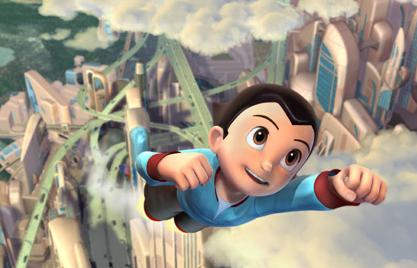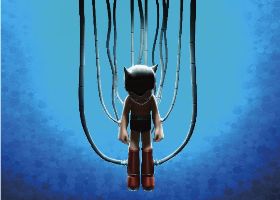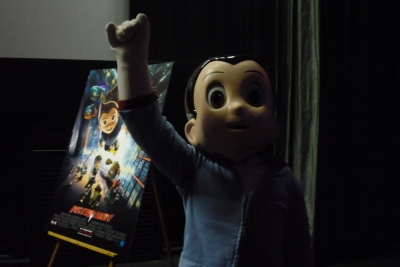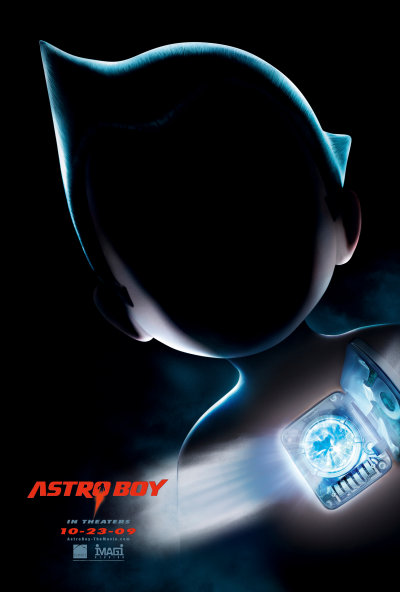In Japan, Astro Boy needs no introduction. He’s as instantly recognizable to Japanese of all ages as Mickey Mouse and Superman are to Americans; the fictional character even enjoys an honorary citizenship in Niiza, Saitama. It’s likely that most Americans have never even heard of Astro Boy until now, but Summit Entertainment and Imagi Studios hope that he’ll become a household name this side of the Pacific thanks to their big-budget, star-studded animated film, Astro Boy, which opens in wide release this Friday, October 23.
This isn’t the first animated outing for the little robot who could, though it is the first to originate in the United States. There have been three animated TV series in the last forty-six years, all produced in Japan and based on the original manga serial by Osamu Tezuka, who is often called the “God of Manga.” The Tetsuwan Atom (“The Mighty Atom”) comics were published from 1952 to 1968, and the black-and-white cartoon appeared in 1963, setting the template for all anime that followed. That year the show also became the first anime import to the U.S., dubbed into English and renamed Astro Boy for broadcast on NBC.
This latest adaptation of Tezuka’s masterpiece relies on voiceover narration (Charlize Theron) to introduce newcomers to the world of the future: a floating metropolis named Metro City where the privileged live in towering skyscrapers with flying cars and robot servants. The mechanical workforce performs all the jobs deemed too unappealing or unsafe for humans, but when robots wear out or run down they’re simply thrown away. Viewed by many people as “junk waiting to happen,” their discarded bodies litter the piles of trash covering the planet’s surface far below the city.
Tobey (Freddie Highmore), the precocious and slightly arrogant son of renowned roboticist Dr. Tenma (Nicolas Cage), sneaks into the Ministry of Science to see his father’s latest creation, the Peacekeeper. The giant robot is to be given an incredible power source known as “blue core energy,” pure positive energy derived from a star fragment, which Dr. Elefun (Bill Nighy) hopes will enable it to clean up the Earth. But President Stone (Donald Sutherland) insists on using the unstable “red core energy” instead, thinking that the negative byproduct of the star will be more powerful. He plans to use the Peacekeeper to start an arms race with the surface dwellers—he’s seeking re-election, and war makes for better headlines than peace. The experiment goes terribly wrong and the super-charged Peacekeeper turns on its creators, vaporizing Tobey before it can be neutralized.
Wracked with guilt and devastated by the loss of his son, Dr. Tenma applies his mad genius to the creation of a perfect robot replica of his son, complete with Toby’s memories (gleaned from the DNA in a strand of hair from Tobey’s baseball cap, which miraculously survived the blast). The doctor has also made some improvements so he won’t lose him again; Tobey the robot is equipped with powerful defensive systems, and is powered by Dr. Elefun’s blue core energy. When Tobey is activated, he actually believes himself to be Tenma’s son, though he knows something isn’t right.
 It doesn’t take long before Dr. Tenma realizes he can never replace his son with a machine and regrets his mistake. Meanwhile, Tobey discovers strange new abilities, such as rocket-powered flight and super strength. When Tenma confesses he doesn’t love Tobey, the robot decides to strike off on his own, with Dr. Elefun’s assurance that he will find his place in the world.
It doesn’t take long before Dr. Tenma realizes he can never replace his son with a machine and regrets his mistake. Meanwhile, Tobey discovers strange new abilities, such as rocket-powered flight and super strength. When Tenma confesses he doesn’t love Tobey, the robot decides to strike off on his own, with Dr. Elefun’s assurance that he will find his place in the world.
President Stone finds out that the blue energy wasn’t destroyed as Elefun claimed and initiates a search for Tobey. During a pursuit, the robot is blasted out of Metro City and lands on the garbage-strewn surface, where he soon falls in with a group of young kids. Pretending to be human, and wrestling with his true identity, Tobey takes the name Astro and befriends a girl named Cora (Kristen Bell), who helps him discover his destiny.
Astro Boy is very much for children, filled with explosive action, robot-on-robot violence, and even a cute, dog-like robot trash can sidekick. But despite its young target audience, the movie explores some heavy themes, in admittedly simplistic and often heavy-handed terms. The battle between good and evil is symbolized via blue positive energy and red positive energy, and parallels the other less-straightforward struggles between humans and robots, the surface world and Metro City—even capitalism and socialism to some degree (embodied in the comical Communist-inspired Robot Revolutionary Front, which aims to free the robotic workers from human slavery).
Eventually Astro’s worlds collide literally and figuratively; his secret is exposed; and it’s probably no surprise that there’s a big dustup coming with a certain giant robot at the end of the film. There’s plenty of humor that caters to adults, from sight gags to clever puns and pop culture references for an older generation (eg. a TV show titled Robots Gone Wild and a philosophy book named Descartes: Before the Horse). When Astro lands in a scrap heap, zombie-like robots swarm around him, falling to pieces and thirsting for fresh batteries. The garbage-covered Earth will remind many of another, arguably better robot movie, WALL*E.
The film’s 3-D CGI is a startling, perhaps even jarring departure from Astro Boy‘s two-dimensional roots. The animation by Imagi Studios (which brought us last year’s rebooted TMNT, also in CGI) may not be as polished as its Pixar brethren, but it fits Tezuka’s exaggerated style and evokes a bright and colorful future. Everything has a shiny, plastic quality, like the toys that are sure to follow, and the animation is smooth and impressive. The requisite scenes of Astro enjoying his first flight are beautiful, and the fight sequences and explosions are every bit as exciting as a Hollywood blockbuster. One quiet scene is particularly moving, when Astro and his friends encounter a century-old construction robot in an inexplicably lush meadow. For a moment, it’s as though they’ve stumbled into  Miyazaki’s Castle in the Sky. That film also may have inspired other elements of Astro Boy, such as the floating Metro City, hearkening back to both Fritz Lang’s seminal Metropolis (1927) and the 2001 anime of the same name, which was also based on Tezuka’s work. There are also some evocative images early on that hint at Astro’s connection to Pinocchio, in the power cables holding him in his “birth” scene and later when Astro literally pulls away from string-like restraints as he escapes the government forces after him.
Miyazaki’s Castle in the Sky. That film also may have inspired other elements of Astro Boy, such as the floating Metro City, hearkening back to both Fritz Lang’s seminal Metropolis (1927) and the 2001 anime of the same name, which was also based on Tezuka’s work. There are also some evocative images early on that hint at Astro’s connection to Pinocchio, in the power cables holding him in his “birth” scene and later when Astro literally pulls away from string-like restraints as he escapes the government forces after him.
The director, David Bowers, is no stranger to CGI animation, having directed the modestly successful Flushed Away for Aardman Animations and Dreamworks. Given the long history of Astro Boy, Bowers had his work cut out for him, faced with his own balancing act between U.S. and Japanese sensibilities. At the Q&A following the preview screening at the IFC Center on October 18, a young boy asked how he chose what to include in the film. He answered that he had to make a lot of changes to fit the story into ninety minutes, but that he chose the parts that interested him the most, and hopefully the film will encourage people to read the original manga to find out where Astro came from.
Astro Boy purists may be upset by the changes—any changes—but there seems to be a good reason for many of them, and in some cases the story has been slightly improved. The most noticeable and potentially controversial alteration is Astro’s shockingly clothed state for most of the movie, though there are a few scenes with Astro’s classic look. The biggest plot change is in his origin. It’s clear that Bowers was interested in the father-son relationship, and decided to focus on making Tobey’s death more heart-wrenching by involving Dr. Tenma rather than leaving it to a random accident. Tenma is no longer cast as a shady villain, driven to madness only by his own grief. This added complexity to the character’s motivations is a thoughtful and welcome addition.
As an audience member mentioned after the screening, it would have been nice if more strong female characters were included, as long as changes were being made. Tobey’s mother is never even mentioned, and unfortunately the only female protagonist is Cora. If you’re worried about an Americanized Astro Boy, it’s worth noting that Tezuka himself often revised his own work, and he explored the same themes and stories while recycling the same stable of characters throughout his career. Overall the material was handled respectfully with an eye to making it more widely accessible; according to Bowers, Tezuka’s son even consulted on the film. It was a nice surprise to see Astro’s creator correctly credited as “Tezuka Osamu,” according to Japanese naming conventions.
 Though the film is much simpler than it could have been, considering its intended audience, it never really feels dumbed-down. Obviously scientific and technological realism were never a concern, but these oversights don’t stand in the way of a good time. Astro Boy is a strikingly sentimental film at times, emphasizing kindness and friendship, with more layered characterization than one might expect from your average Saturday morning cartoon. There’s also a measure of political commentary for those who look for it, including the ambitious president, the communist RRF, a battle robot named Peacekeeper, and a warship ironically named the Spirit of Freedom which pursues Astro throughout the movie.
Though the film is much simpler than it could have been, considering its intended audience, it never really feels dumbed-down. Obviously scientific and technological realism were never a concern, but these oversights don’t stand in the way of a good time. Astro Boy is a strikingly sentimental film at times, emphasizing kindness and friendship, with more layered characterization than one might expect from your average Saturday morning cartoon. There’s also a measure of political commentary for those who look for it, including the ambitious president, the communist RRF, a battle robot named Peacekeeper, and a warship ironically named the Spirit of Freedom which pursues Astro throughout the movie.
From the audience response after the screening, very young kids may find portions of the PG-rated film scary, and some may not understand what happened to the real Tobey, but most children and parents enjoyed Astro Boy. I’d certainly recommend bringing your kids to this one, or giving your inner child a chance to come out and play.
Eugene Myers felt incredibly old while discussing anime with a man and his young daughters at the preview screening for Astro Boy. He combats senescence by writing young adult fiction, until he can transfer his consciousness into a robot body (with or without machine guns stored in its butt). You can follow his progress on both fronts at www.ecmyers.com.










